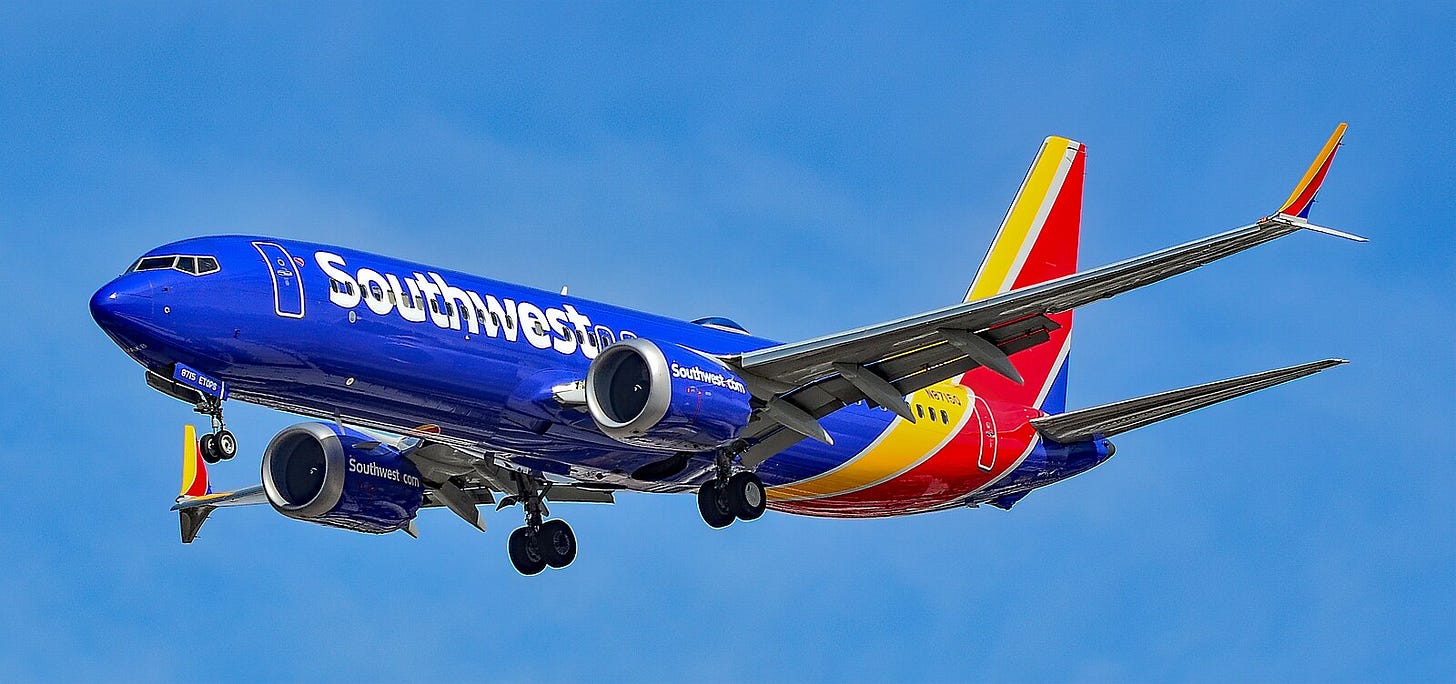The airline that has no idea why you fly with them
Southwest ditches its beloved 'bags fly free' policy
I have a confession to make. Sometimes, when I have a bit of spare time, or I’m waiting for the bus, or it’s a Tuesday, I go on Google Flights and search for journeys I have no intention of making.
To inject a dose of jeopardy, I’ll set myself a specific challenge. For example, can I fly from London to Sydney in business class on April 16 for less than £2,500? (The answer is ‘yes’, but it involves two layovers, including 7 hours and 15 minutes stranded at Jinan Yaoqiang International Airport in eastern China).
That’s the thing about comparison websites – they pretty much reduce the search experience to price. And when the only variable is price, consumers pick the cheapest option, which is how so many of us end up at Stansted Airport short-term parking at 5:55am. I mean, it was £6 cheaper than the later flight.
But this is something of a disaster for the airlines, many of whom go to terrific (and often capital-intensive) lengths to differentiate themselves, whether through their hard product (e.g. the seat, size of the television screen) or soft product (e.g. service, food and drink).
Southwest Airlines is a great example of this. For years, the airline has sought to differentiate itself from its competitors through one simple promise: it did not charge for checked luggage. Anyone flying the low-cost carrier could deposit two bags, a valuable perk when all other major airlines – including legacy carriers such as American, United and Delta – were charging often hefty sums. Indeed, baggage fees generated more than $7bn in revenue for US carriers in 2023.
That’s what makes Southwest different. Or, rather, made. Last week, the company announced that it would start charging for bags from May 28. This may seem like a niche change and certainly an esoteric subject for a newsletter, but Southwest built an entire marketing campaign and brand identity on the basis that checked bags were free. In an ominous sign, rival airline executives can scarcely contain their glee.
“Clearly there are some customers who chose them because of that [free bags policy],” said Ed Bastian, CEO of Delta. “Now, clearly those customers are up for grabs.” Scott Kirby, CEO of United Airlines, crowed: “It’ll be good for everyone else… It’s the slaying of a sacred cow. I view it as a big deal.”
To provide a bit of context, Southwest, long a darling of the aviation industry, has been seeking to cut costs and boost revenues after activist investor Elliott Investment Management purchased a $1.9bn stake in the company last June. Elliott subsequently secured seats on the board, and Southwest recently announced it would be cutting some 1,750 jobs, the first major layoffs in its history.
Will it work? Frankly, it is weird to be asking me. I write a free daily newsletter and, come to think of it, after more than a decade in the workforce, have never actually been at a company that turned a profit. But Southwest itself is a little sceptical.
Only last September, its executives reiterated that the free bags policy was a vital part of the Southwest brand and here to stay. Indeed, AP reports that the airline estimated that charging for bags would generate $1.5bn a year, but cost the airline $1.8bn in lost business.
I’m not suggesting that no one will fly Southwest anymore. It may still, in some markets, be the most convenient or cost-effective option. But it is extraordinary how many customers have remarked that the free bags policy was the main, or even only reason they flew with the airline. This makes sense given that, unlike many of its competitors, Southwest has few other perks, such as seatback screens or airport lounges.
An error many businesses make is that they spend far too much time talking about features and not enough about benefits. Take for example a king-size bed. Its main feature is that it is larger than a queen or double. But the benefit? A better night's sleep. Or fibre-optic broadband. The feature may be 60Mbps. But the benefit? FaceTiming with friends and family around the world without ever suffering from a poor connection again.
It is the same for free checked bags. The feature is, well, customers don’t have to pay to check their bags. But the benefit? Passengers don’t have to worry about exceeding carry-on weight limits or fighting for limited space in overhead bins. Meanwhile, the policy has sparked a brand halo effect that has driven an unusual level of loyalty in a price conscious industry with famously tight profit margins.
Still, investors are happy. Shares in Southwest jumped almost 9%. But for a company that went as far as trademarking the slogan, “Two bags fly free”, it represents one heck of a risk. Competing on price is a blood sport. Now, Southwest is well and truly in the game.




Yeah but I’m from a land down under where bags always fly free and men chunder.